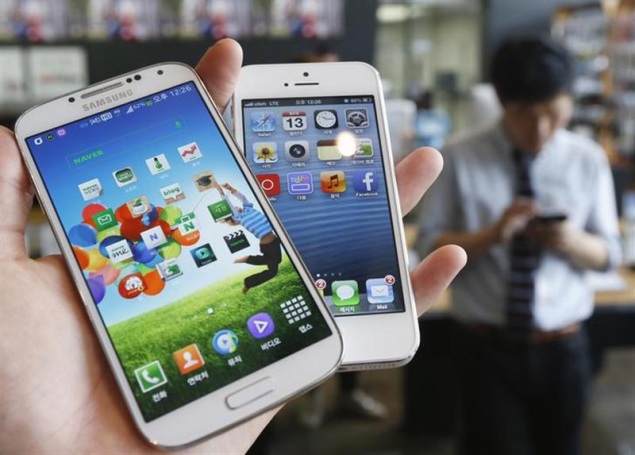A
U.S. judge on Thursday rejected Apple's request for a permanent sales
ban in the United States against some older Samsung smartphones, a key
setback for the iPhone maker in its global patent battle.
U.S. District Judge Lucy Koh in San Jose, California, ruled that Apple Inc
had not presented enough evidence to show that its patented features
were a significant enough driver of consumer demand to warrant an
injunction.
Apple and Samsung Electronics Co Ltd
have been litigating for nearly three years over
various smartphone features patented by Apple, such as the use of
fingers to pinch and zoom on the screen, as well as design elements such
as the phone's flat, black glass screen.
Apple was awarded more
than $900 million by U.S. juries but the iPhone maker has failed to
sustain a permanent sales ban against its rival, a far more serious
threat to Samsung, which earned $7.7 billion last quarter.
The
ruling on Thursday comes ahead of another patent trial set to begin
later this month involving newer Samsung phones, and could frustrate any
further attempt by Apple to bar the sales of those models as well.
(Also see: Apple wins $1 billion in patent case against Samsung)
An Apple spokeswoman declined to comment on the order.
In
a statement, Samsung said it was pleased with the ruling. "We ... agree
with its observation that a few software features alone don't drive
consumer demand for Samsung products - rather consumers value a
multitude of features," the company said.
Even though Samsung no
longer sells the older-model phones targeted by the injunction request,
Apple has argued in court documents that such an order is important to
prevent Samsung from future copying with new products "not more
colorably different" than the defunct models.
Samsung, meanwhile,
argued that Apple was trying to target new Samsung phones in order to
instill fear and uncertainty among carriers and retailers.
Samsung's phones use the Android operating system, developed by Google Inc .
A
Northern California jury found that Samsung infringed several Apple
patents after a widely watched 2012 trial. Following the trial, Koh
rejected Apple's request for a sales ban, but in November, the U.S.
Court of Appeals for the Federal Circuit ordered her to reconsider
Apple's evidence of market demand.
(Also see: Apple seeks ban on Samsung phones, tablets in the US)
In her ruling on Thursday, Koh
wrote that a consumer survey by Apple likely inflated the value that
customers place on the patented smartphone features in dispute.
"A
multitude of other survey evidence not prepared for the purpose of
litigation," Koh wrote, "indicates that numerous features that were not
tested - such as battery life, MP3 player functionality, operating
system, text messaging options, GPS, and processor speed - are highly
important to consumers."
Apple must demonstrate more than an
insignificant amount of lost sales due to Samsung's copying, Koh wrote,
and Apple's survey is "unpersuasive" evidence on that point.
In a
separate order, Koh entered final judgment against Samsung for about
$930 million in damages stemming the 2012 jury finding of patent
infringement. Samsung said it would appeal that decision.
The case in U.S. District Court, Northern District of California is Apple Inc vs Samsung Electronics Co Ltd, 11-1846.
© Thomson Reuters 2014
 Apple's Foldable iPhone to Sport Display With Same Aspect Ratio as iPad Models, Tipster Claims28 March 2025
Apple's Foldable iPhone to Sport Display With Same Aspect Ratio as iPad Models, Tipster Claims28 March 2025 Google Play Store Blocks 17 Unregistered Crypto Exchanges in South Korea, Apple May Follow27 March 2025
Google Play Store Blocks 17 Unregistered Crypto Exchanges in South Korea, Apple May Follow27 March 2025 iPhone 17 Series to Reportedly Get 8K Video Recording Support27 March 2025
iPhone 17 Series to Reportedly Get 8K Video Recording Support27 March 2025 Apple iPhone 16e Review: When You Just Need an iPhone27 March 2025
Apple iPhone 16e Review: When You Just Need an iPhone27 March 2025 Apple Appoints Global Head for Its Retail Stores in Latest Management Shift27 March 2025
Apple Appoints Global Head for Its Retail Stores in Latest Management Shift27 March 2025

![Gadgets 360 With Technical Guruji: News of the Week [March 29, 2025]](https://c.ndtvimg.com/2025-03/9cu1890s_news-of-the-week_160x120_29_March_25.jpg?downsize=180:*)












